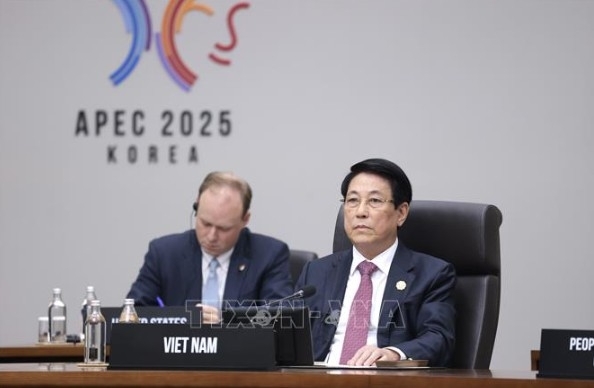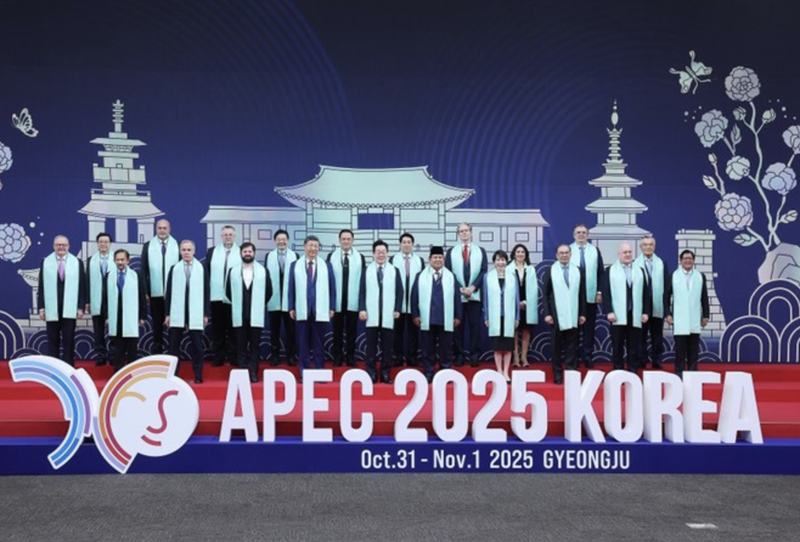In his remarks, President Luong Cuong pointed out a fast-changing world driven by breakthrough sci-tech advances coupled with strong cultural, social, and environmental changes, which requires APEC economies to make proactive response and enhance cooperation to seize opportunities and surmount challenges.
To adapt to the rapid development of artificial intelligence (AI) and shaping a more inclusive, sustainable, and humanistic growth model, he suggested several major cooperation orientations for APEC.
    |
 |
|
State President Luong Cuong attends the second plenary session of the 32nd APEC Economic Leaders’ Meeting in Gyeongju city, the Republic of Korea, on November 1, 2025. |
In particular, APEC members should form a common strategic vision on developing an innovation ecosystem and promoting a pioneering role in digital economy and AI governance, especially building necessary standards and rules to ensure a balance between businesses’ development motivation and the legitimate interests of people and social progress, as well as to ensure equal opportunities among economies.
In addition, he went on, APEC needs to focus on building comprehensive and sustainable infrastructure, along with a safe and reliable digital ecosystem for digital economy development in the region.
The President also affirmed the need for mutual trust – trust in cooperation to build a dynamic, modern, safe, happy, and prosperous future for all in Asia-Pacific.
Sharing Vietnam's viewpoint, the State leader emphasized that the country views science, technology, innovation, and digital transformation as the cornerstone for a new stage of development with fast and sustainable growth; and that innovation is the cause of all people and the entire society, demanding the participation of all-level authorities, all sectors, businesses of all economic sectors, and all people.
With the presence of leaders and heads of delegations of the 21 APEC member economies, the meeting affirmed the members’ determination to build a resilient region ready to face challenges, achieve sustainable economic growth, and bring about benefits to all people.
Amid regional and global uncertainties, as well as intertwined opportunities and challenges, the leaders emphasized the key role of APEC as the leading regional economic integration forum and an incubator, a place to test innovative and breakthrough ideas.
Affirming the indispensable role of trade and investment in regional development and prosperity, they pledged to push ahead with regional economic integration; enhance connectivity in all three aspects: infrastructure – institutions – people-to-people exchanges; support the development of small and medium-sized enterprises; and promote trade facilitation efforts, measures to enhance transparency and paperless trade, and back efforts to ensure resilient supply chains in the region and the world at large.
To prepare the region for digital transformation, the meeting agreed that achievements in science, technology, and AI application must serve humanity. The leaders encouraged economies to voluntarily share information on appropriate digital and information technology policies to accelerate regional economic cooperation; build a safe, reliable, and accessible AI ecosystem; invest in and develop energy-saving and environmentally friendly infrastructure.
The event reaffirmed the commitment to implementing the APEC Internet and Digital Economy Roadmap; enhancing members' capacity to participate in the digital transformation process through cooperation, training, and capacity building; stepping up cooperation to narrow the digital gap, ensuring that all people gain access to and enjoy the benefits of digital transformation.
    |
 |
|
Leaders of APEC economies in a group photo |
To jointly address challenges and share growth benefits, participants vowed to strengthen collaboration to effectively respond to challenges such as energy and food insecurity, natural disasters, and extreme climate events. In particular, amid demographic changes in the region, leaders called for a collective, comprehensive, and intergenerational approach to employment, education, health, and public finance, to overcome challenges and explore opportunities to foster development and growth for the Asia-Pacific region.
Concluding the event, the APEC leaders adopted the Gyeongju Declaration, affirming their strong commitment to jointly promoting new growth drivers, tapping into the potential and strengths of the forum, and working towards the goal of building an open, dynamic, resilient, and peaceful Asia-Pacific community for the prosperity of all people and future generations.
The leaders also agreed to endorse the APEC Artificial Intelligence Initiative and the APEC Collaborative Framework for Demographic Changes to strengthen cooperation in the face of new development trends in the region and the world.
APEC members congratulated the Republic of Korea for successfully hosting the 32nd APEC Economic Leaders’ Meeting and APEC Year 2025. They also congratulated China on assuming the role of host of APEC Year 2026.
Source: VNA